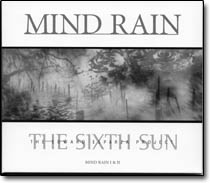|
Ignacio native Edward Esparza releases
a "thinker's album"
by Amy Maestas
 |
| Edward Esparza has just
released his debut album, “Mind Rain I &
II.” The Ignacio resident hopes his exploratory
album will serve as a creative catalyst for others./Photo
courtesy Edward Esparza |
Edward Esparza’s life journey, his challenges,
his pain and his happiness are, unlike some people, neatly
packaged in a sleek plastic case. It’s where he
keeps his unbridled creativity, and it is, ultimately,
a paean to his life.
Esparza, a lifelong Ignacio resident, has just released
his debut music CD – “Mind Rain I & II,”
the first of a two-CD set. Fresh from the recording studio,
Esparza is working hard to promote his exploratory new
album that he hopes will not only sell well, but also
serve as a catalyst for anyone with an abundance of creative
juices to produce art.
“Mind Rain” is chock-a-block full of instrumental
experimentation. It defies any type of categorization,
though Esparza knows people will try to find a label for
it. Mood music is too general, since it evokes a sense
of soothing tunes for relaxation. New Age is too ephemeral
and corny. It’s far too involved to be instrumentally
generic. Throw out rock, jazz, classical, blues –
at least as individual genres. In the end, Esparza’s
CD is a work that stands alone – incapable of being
pigeonholed yet not so bizarre that it isn’t recognizably
influenced by mainstream music.
That being said, Esparza achieved his goal.
“I like the fact that it’s so complicated
and it’s not obvious music,” Esparza says.
“I wouldn’t be happy if you could categorize
it.”
“Mind Rain” is an array of music that showcases
Esparza playing the nylon, acoustic and electric guitars,
the piano, keyboards, bass, percussion and drums. With
the exception of Steve Deika on drums and percussion,
Esparza brings the music on the  CD
together single-handedly. With the melange of instruments,
he creates a journey of hope and darkness as the music
moves from melodious sonatas akin to the classics to screeching
guitar riffs a la Joe Satriani. He effectively blends
the wistful songs that evoke introspection and mood swings
with the more electrically stimulating ones that may lead
to an anxiety-producing crescendo. CD
together single-handedly. With the melange of instruments,
he creates a journey of hope and darkness as the music
moves from melodious sonatas akin to the classics to screeching
guitar riffs a la Joe Satriani. He effectively blends
the wistful songs that evoke introspection and mood swings
with the more electrically stimulating ones that may lead
to an anxiety-producing crescendo.
Along the way, Esparza overlays social, political and
philosophical sound bites. The type and meaning of quotes
are as varied as the music. There is Martin Luther King
Jr., sharing his now-famous “I Have a Dream”
speech. There is astronaut Neil Armstrong describing the
loamy soil and atmosphere as he stepped, for the first
time, on the moon. There is the newscaster woefully describing
the loss of the New York City skyline and scores of Americans.
The sound bites don’t stop there – Esparza
also scatters quotes on the CD case, exposing the thoughts
and ideas of everyone from William Shakespeare to Jim
Morrison.
Somehow, it works, in spite of the risk.
This kind of artistic exploration compels Esparza to
describe his music as “intelligent.” He blends
his philosophical tastes with his music, hoping to mimic
a sort of death and rebirth of his creativity.
“I kind of like how Joseph Campbell (the mystic
and popular author) says that death, whether physical
or mental, leads to rebirth and regrowth,” Esparza
explains.
That concept helped him form a project that pushed the
limits of his musical talent. It was just one more challenge
of the many he has faced in his life. They haven’t
been anything atypical, he says, but because challenges
are subjective, Esparza says he used his life lessons
to concoct a project that emulates human survival.
“For anyone who has a creative influence in their
life and has a desire to do something with themselves,
you either ignore it or go with it. The problem is, if
you ignore what you are supposed to do – creatively
– it leads to bad things.”
Consequently, Esparza says his project was so integral
to his well being that he felt as though he had to “regurgitate”
in order to be at peace in life. “I had no choice,”
he says.
Initially, Esparza’s idea was to create an instrumental
CD without the quotes. But as the project progressed,
he felt that interjecting the quotes would create a more
thought-provoking experience.
“I like to define it as a thinker’s album,”
he says. “It’s not about making a political
statement or anything. I just think that, as a society,
we are just on the edge of self-destruction. But we are
also starting to open up to our feelings. I want to get
us in touch with those feelings.”
What message people take away from listening doesn’t
matter, he adds. Since art is a deeply personal experience,
no matter the medium, Esparza expects only that people
listen to his music with an open mind and a willingness
to explore the unfamiliar.
He admits that his concept is abstract enough that it
may limit his audience. Some people don’t instantly
connect with his CD.
“Some just don’t get it at all,” he
says. “I can’t explain it to them, though.
For me, it’s personal. They don’t understand
how destruction comes from not doing something with your
creativity.”
Yet, Esparza says that he took the risk of creating something
so uncharacteristic because of Durango audiences. He puts
great stock in local music listeners to appreciate something
extraordinary, where an artist has willfully interwoven
his soul with his craft – however, peculiar the
outcome.
“People are ready for this kind of intelligent
music.”
|

